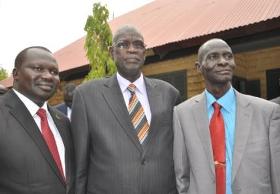Jonglei citizens urged to respect human rights
December 10, 2014 (BOR) – The Jonglei state government has urged its citizens to respect the sanctity of human rights.

“Observing and protecting human rights is [the] duty of all. When I say all of us – I mean government, members of international community and as well as individual citizens throughout our state,” Medan said in his speech.
“In South Sudan, human rights violations are always done by unpatriotic citizens who put their self interests first. In this regard, I am asking all of you to do what you can to ensure unconditional freedom for each and every citizen in Jonglei state,” he added.
The program featured cultural dance performances by Dinka Bor youth and school children.
However, attendance was poor at the celebrations organised by the United Nations Mission in South Sudan (UNMISS) in collaboration with the government.
Also speaking at the event was UNMISS state coordinator Hazel De Wet, who urged the citizens to remain committed to human rights laws.
“All human beings are born free and equal in dignity and rights. This human rights are not country specific, they are not reward for good behaviour or particular to a certain area or social group,” she said.
“The power of the universal declaration is the power of ideas to change the world. It tells us that human rights are equal and indivisible,” she added.
Boor was a flashpoint for violence after conflict erupted in the country last December, changing hands several times between government and rebel forces.
The security situation in the town is now largely calm and displaced Lou Nuer who had been sheltering at the UN site have been encouraged to return to their homes and live freely in Bor.
Some of the returnees have since begun attending public functions in Bor.
South Sudan’s warring parties have both been accused of committing grave human rights violations and abuses since the conflict broke out, particularly in Jonglei, Upper Nile and Unity states.
In August, the African Union conducted investigations into suspected war crimes and crimes against humanity in Jonglei state and other areas, however, the report has not been made public.
Many of the victims in Jonglei were women, with some found dead next to their babies.
It has also been alleged that women were raped and brutalised by government troops when they returned to Bor in February.
The United Nations General Assembly declared 10 December international Human Rights Day at its 317th plenary meeting in 1950.
(ST)
